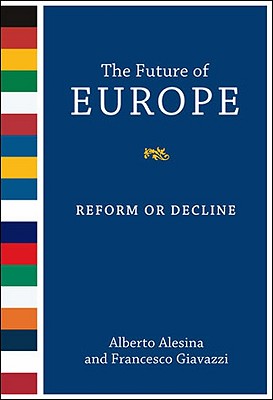

 MIT Press
MIT Press
The Future of Europe: Reform or Decline


Key Metrics
- Alberto Alesina
- MIT Press
- Paperback
- 9780262512046
- 8.96 X 6.06 X 0.52 inches
- 0.62 pounds
- Business & Economics > International - Economics & Trade
- English
 Secure Transaction
Secure TransactionBook Description
A provocative argument that unless Europe takes serious action soon, its economic and political decline is unavoidable, and a clear statement of the steps Europe must take before it's too late.
Unless Europe takes action soon, its further economic and political decline is almost inevitable, economists Alberto Alesina and Francesco Giavazzi write in this provocative book. Without comprehensive reform, continental Western Europe's overprotected, overregulated economies will continue to slow--and its political influence will become negligible. This doesn't mean that Italy, Germany, France, and other now-prosperous countries will become poor; their standard of living will remain comfortable. But they will become largely irrelevant on the world scene. In The Future of Europe, Alesina and Giavazzi (themselves Europeans) outline the steps that Europe must take to prevent its economic and political eclipse.
Europe, the authors say, has much to learn from the market liberalism of America. Europeans work less and vacation more than Americans; they value job stability and security above all. Americans, Alesina and Giavazzi argue, work harder and longer and are more willing to endure the ups and downs of a market economy. Europeans prize their welfare states; Americans abhor government spending. America is a melting pot; European countries--witness the November 2005 unrest in France--have trouble absorbing their immigrant populations. If Europe is to arrest its decline, Alesina and Giavazzi warn, it needs to adopt something closer to the American free-market model for dealing with these issues.
Alesina and Giavazzi's prescriptions for how Europe should handle worker productivity, labor market regulation, globalization, support for higher education and technology research, fiscal policy, and its multiethnic societies are sure to stir controversy, as will their eye-opening view of the European Union and the euro. But their wake-up call will ring loud and clear for anyone concerned about the future of Europe and the global economy.
Author Bio
Alberto Alesina was a leader in the field of Political Economics and has published extensively in all major academic journals in economics. He has published five books and edited many more. His two most recent books are The Future of Europe: Reform or Decline, published by MIT Press, and Fighting Poverty in the US and Europe: A World of Difference, published by Oxford University Press. He was a co-editor of the Quarterly Journal of Economics for eight years and associate editor of many academic journals.
Alberto Alesina, born in Italy in 1957, was the Nathaniel Ropes Professor of Political Economy at Harvard University. He served as Chairman of the Department of Economics from 2003 - 2006. He obtained his Ph.D. from Harvard in 1986. He was also a member of the National Bureau of Economic Research and the Center for Economic Policy Research. He was a member of the Econometric Society and of the American Academy of Arts and Sciences.
He was a leader in the field of Political Economics and has published extensively in all major academic journals in economics. He has published five books and edited many more. His two most recent books are The Future of Europe: Reform or Decline, published by MIT Press, and Fighting Poverty in the US and Europe: A World of Difference, published by Oxford University Press. He was a Co-editor of the Quarterly Journal of Economics for eight years and Associate Editor of many academic journals. He has published columns in many leading newspapers around the world and has visited several institutions including MIT, Tel Aviv University, University of Stockholm, The World Bank, and the IMF.
His work has covered a variety of topics: political business cycles, the political economy of fiscal policy and budget deficits, the process of European integration, stabilization policies in high inflation countries, the determination of the size of countries, currency unions, the political economic determinants of redistributive policies, differences in the welfare state in the US and Europe and, more generally, differences in the economic system in the US and Europe, the effect of alternative electoral systems on economic policies, and the determination of the choice of different electoral systems.
Source: Harvard University Department of Economics
Videos
No Videos
Community reviews
Write a ReviewNo Community reviews